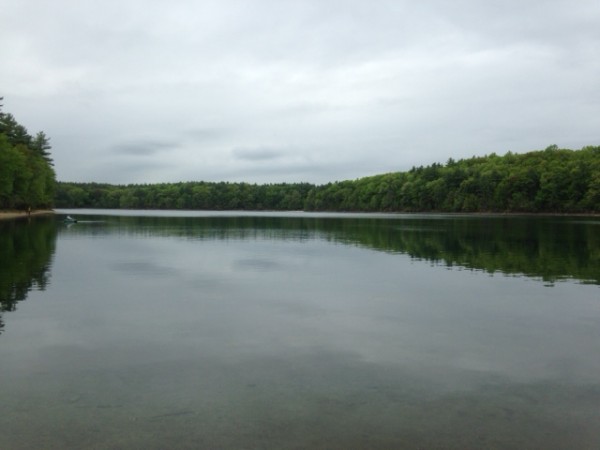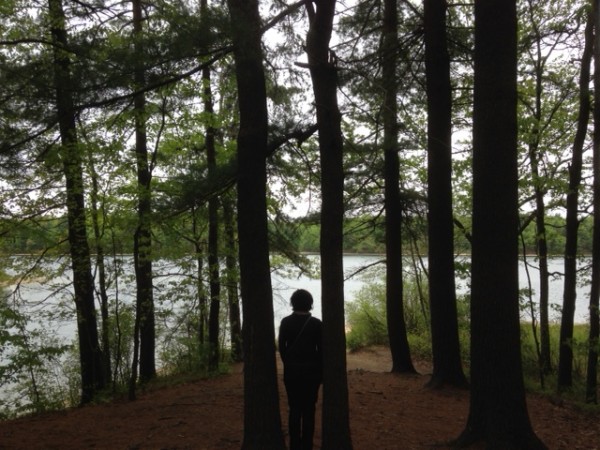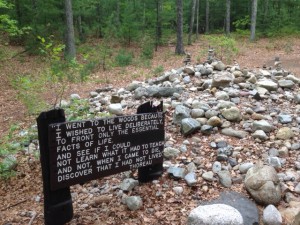 When Henry David Thoreau wandered into the woods on July 4, 1845, to start his live-in-nature experiment, the setting was a fairly young forest around a pond that had been formed more than 10,000 years earlier by glaciers in the eastern Massachusetts countryside. It is considered a great example of a kettle hole, the name for the sediment left behind by retreating glaciers.
When Henry David Thoreau wandered into the woods on July 4, 1845, to start his live-in-nature experiment, the setting was a fairly young forest around a pond that had been formed more than 10,000 years earlier by glaciers in the eastern Massachusetts countryside. It is considered a great example of a kettle hole, the name for the sediment left behind by retreating glaciers.
Today, Walden Pond is much different but retains enough remnants of that remote isolation. On a recent visit to the area, we hiked the nearly 2-mile loop around the pond, which is a sight in itself. The pond is now a state park complete with beaches, trails and other amenities. But it’s a peaceful place with all the human activity gathered at one end. The bulk of the area is a rich grove of young and old trees surrounding the idyllic water spot.
 While following the trail around the pond, I heard splashing in the water and assumed it was a duck. There were a few of those, but I watched as four swimmers gently moved through and across the calm surface. Further down the trail, there is of course a memorial to the remains of Thoreau’s famous cabin. The wood from the cabin was pulled apart soon after his two-year residency ended but there is a marker and a pile of stones to mark the space. Off the trail a bit is a re-creation of the cabin if you want the historical perspective.
While following the trail around the pond, I heard splashing in the water and assumed it was a duck. There were a few of those, but I watched as four swimmers gently moved through and across the calm surface. Further down the trail, there is of course a memorial to the remains of Thoreau’s famous cabin. The wood from the cabin was pulled apart soon after his two-year residency ended but there is a marker and a pile of stones to mark the space. Off the trail a bit is a re-creation of the cabin if you want the historical perspective.
There are a few spurs off the main path to lead to different views of the lake, and there are swimming opportunities throughout. It is clearly a lake to be savored, not admired from afar. Railroad tracks and a nearby highway bring plenty of noise to what was a quite place 150 years ago, but it is still peaceful enough. Named after a small market town in Essex, England, Walden Pond was not quite untapped back in Thoreau’s time. It was a key commercial source of ice, which was ‘harvested’ (if you will) from the pond and then exported across America and as far overseas as India.
If you’re in the area, I recommend encircling Walden Pond for a brief walk that could possibly refresh your soul as much as your legs.
 Thoreau loved hiking and canoeing, and imagined that life in nature might bring him freedom from civilization and its constraints. It didn’t quite do the trick for the avid hermit and preservationist. Yet his writing that came during that time — and was later inspired by it — has certainly endured and marked his legacy.
Thoreau loved hiking and canoeing, and imagined that life in nature might bring him freedom from civilization and its constraints. It didn’t quite do the trick for the avid hermit and preservationist. Yet his writing that came during that time — and was later inspired by it — has certainly endured and marked his legacy.
I went to the woods because I wished to live deliberately, to front only the essential facts of life, and see if I could not learn what it had to teach, and not, when I came to die, discover that I had not lived. I did not wish to live what was not life, living is so dear; nor did I wish to practise resignation, unless it was quite necessary. I wanted to live deep and suck out all the marrow of life, to live so sturdily and Spartan-like as to put to rout all that was not life, to cut a broad swath and shave close, to drive life into a corner, and reduce it to its lowest terms, and, if it proved to be mean, why then to get the whole and genuine meanness of it, and publish its meanness to the world; or if it were sublime, to know it by experience, and be able to give a true account of it in my next excursion.

 , New York native, I spent half of my life hibernating indoors, but for the past five years I have basked in the thrilling opportunity to enjoy year round hiking on the many trails of beautiful Northern California. In this blog I will continue in the tradition of trailhead, to recap the hikes I have taken and share the insights of my fellow hikers. Along with day hikes, I am also interested in dog friendly trails, and backpacking trips as well. Please feel free to offer suggestions of where I should hike next, or share tales of where you have explored. . Guest blog entries are extremely welcome as are your photos from your own hikes.
, New York native, I spent half of my life hibernating indoors, but for the past five years I have basked in the thrilling opportunity to enjoy year round hiking on the many trails of beautiful Northern California. In this blog I will continue in the tradition of trailhead, to recap the hikes I have taken and share the insights of my fellow hikers. Along with day hikes, I am also interested in dog friendly trails, and backpacking trips as well. Please feel free to offer suggestions of where I should hike next, or share tales of where you have explored. . Guest blog entries are extremely welcome as are your photos from your own hikes.